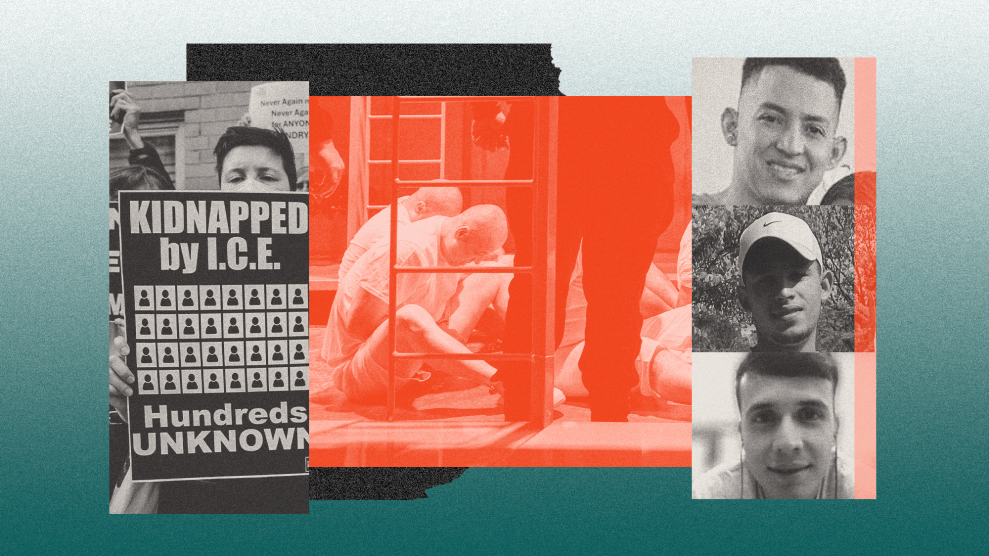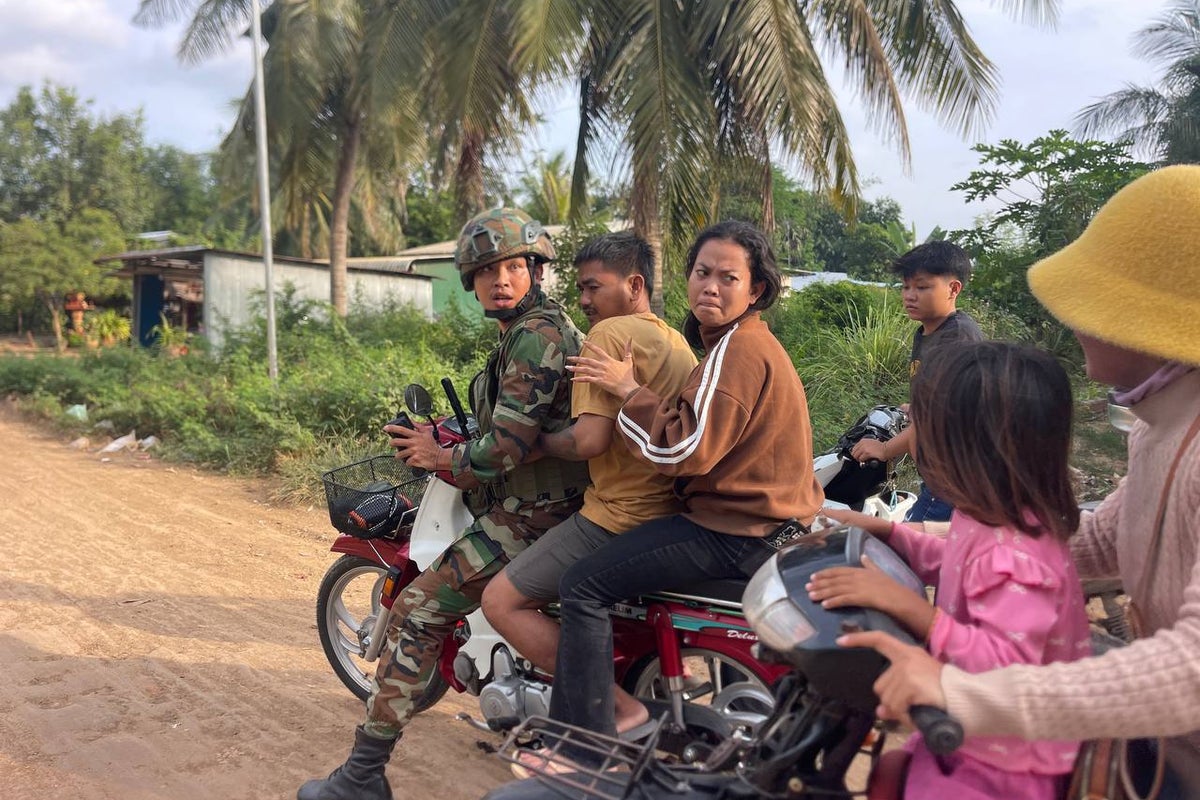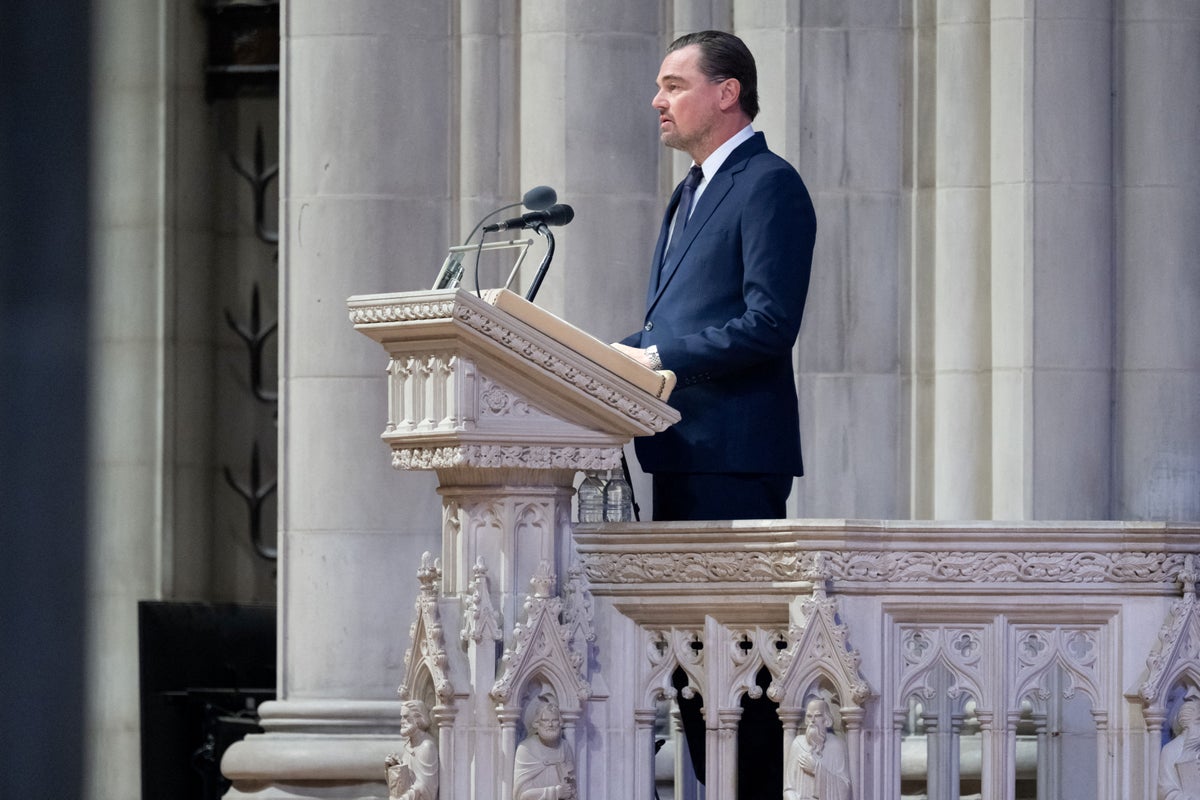Beatings. Sexual assault. Psychological abuse. These are some of the horrors endured by the more than 250 men the United States sent to El Salvador on flimsy evidence of gang membership, according to a new comprehensive report released on Wednesday by Human Rights Watch and Cristosal, a human rights group focused on Central America.
In early 2025, the Trump administration flew Venezuelan migrants to Salvadoran President Nayib Bukele’s notorious Terrorism Confinement Center, where they were held for four months without communication with their families and lawyers. The US government had accused the men of being members of the transnational gang Tren de Aragua and removed most of them from the United States under the Alien Enemies Act—an 18th-century law that President Donald Trump has invoked for only the fourth time in US history.
The men sent to CECOT by the Trump administration used their own blood to write “we are migrants, not terrorists” on a bed sheet.
As Mother Jones and other outlets have reported extensively, most of the men had no serious criminal history in the United States or elsewhere in the world. What they often had instead were tattoos that bore no relation to the gang.
The new report offers even more evidence of the inhumane treatment the Venezuelan migrants endured in El Salvador. Based on the testimonies of 40 men who were detained at CECOT, as well as interviews with 150 other people—including lawyers and relatives in Venezuela, Colombia, and the United States—it paints a damning picture of the abuses inflicted at CECOT.
The Venezuelans were released in July and returned to their country of origin as part of a prisoner swap deal. Shortly after their release, three of the men told us that they faced severe abuse.
“They’re going to kill me here,” Neri Alvarado told us he remembered thinking. “If I survive, I’ll be locked up my entire life.” Alvarado’s case was emblematic of the cruelty of the CECOT detentions. He was targeted by the Trump administration because of his tattoos—the largest of which was an autism awareness ribbon adorned with the name of his younger brother.
These stories were common. Once free, many of the young men were finally able to recount what had happened to them in the Salvadoran prison. They described routine beatings and humiliations, medical neglect, and severe punishments in an isolation cell referred to as la isla, or the island, according to our reporting. “What they did there was torture us,” one of the men said.
HRW and Cristosal found similar evidence of abuse. They concluded that the Venezuelans sent to CECOT “were subjected to what amounts to arbitrary detention and enforced disappearance under international human rights law.” They also found that detainees were subject to “constant beatings and other forms of ill-treatment,” including sexual violence. They also noted guards withholding food and medicine. “Many of these abuses constitute torture under international human rights law,” the report says.
The human rights organizations determined that the abuse was the result of “systematic violations,” rather than independent actions by guards and other officials at the prison. All forty of the men interviewed reported facing severe psychological and physical abuse on an almost daily basis.
The researchers found that the United States became complicit in the men’s forced disappearances by repeatedly denying family members information about where their loved ones were being held. According to the report, the Trump administration violated its legal obligation to uphold the principle of non-refoulement, which prohibits sending people to countries where they are likely to be tortured or persecuted.
In several cases, the men had originally left Venezuela fleeing threats and persecution by the government’s security forces and criminal organizations like Tren de Aragua. After seeking asylum in the United States, they have now been sent back to their home country before they could make their case for protection before an immigration judge in the United States.
“These are hundreds of men who were disappeared into a prison, never accused of anything, with no due process, and no jurisdiction to appeal,” Noah Bullock, Executive Director of Cristosal, said in a press conference on Wednesday outlining the report.
“After the gringa left, the guards came in to beat us,” said one detainee of what occurred after a visit from DHS Secretary Kristi Noem.
The report also sheds new light on the nightmares faced by family members trying to locate relatives who disappeared from the US Immigration and Customs Enforcement’s detainee locator system after being flown to El Salvador. It documents numerous cases in which ICE officials refused to tell relatives where their loved ones were. Instead, the agency’s representatives would only say that the men were no longer in the United States. “Don’t insist,” one family member recalled being told over the phone by an ICE official. “They’re no longer here, find a lawyer to help you.”
The men interviewed by the human rights organizations reported facing severe beatings following visits by Department of Homeland Security Secretary Kristi Noem and Red Cross officials. “After the gringa left, the guards came in to beat us,” one former detainee recalled. “The usual, kneeling outside in the hallway and we were hit with sticks, fists, kicks, slaps on the head … I think that lasted about seven minutes, and then they took us back to our cells.” He also recalled that guards took away their food and confiscated the hygiene products that had been distributed before Noem arrived.
Another Venezuelan, identified in the report as Daniel B, said that after speaking with Red Cross staff, he was taken to “the island” and hit in the stomach until he started choking on the blood.
“My cellmates shouted for help, saying they were killing us,” he recounted, “but the officers said they just wanted to make us suffer.”
In April, riot police retaliated against the men, after they protested guards pepper-spraying a fellow detainee who fainted, by firing rubber pellets at close range. At some point during a hunger strike, the men even used their own blood to write “we are migrants, not terrorists” on a bed sheet.
Along with beatings, the Venezuelans were denied any contact with their families and lawyers as they were held in inhumane conditions. The men said the cells were dirty and moldy and the water—which they used for bathing once a day, as well as drinking—had “visible vermin.” Thirty-seven out of the 40 former detainees interviewed reported falling sick while detained. CECOT, the report states, “appears to have been built to violate the dignity and rights of the people held there.”
The Venezuelan migrants interviewed by HRW and Cristosal said guards repeatedly told them they would never leave CECOT alive and that their loved ones had forgotten them. Some expressed feeling suicidal. “I thought I would be better off dead,” one former detainee said. After their release, many have reported lingering physical injuries and trauma from their time in prison. They described feeling depressed and anxious and having trouble sleeping. “I wake up traumatized, thinking that they are going to arrest me and beat me up,” a man identified as Felipe C. said. “I can’t sleep well. Another told the interviewers: “I feel like I’ve lost everything.”
The organizations are now calling on the Trump administration to stop sending any so-called third-country nationals to El Salvador. They also recommend that Trump revoke the Alien Enemies Act proclamation, and that Venezuelans deported to El Salvador under the act be given a chance to return to the United States to pursue asylum claims.
Human Rights Watch’s Washington director Sarah Yager said the White House, when presented with the findings of the report, repeated that the men sent to El Salvador were criminals.















